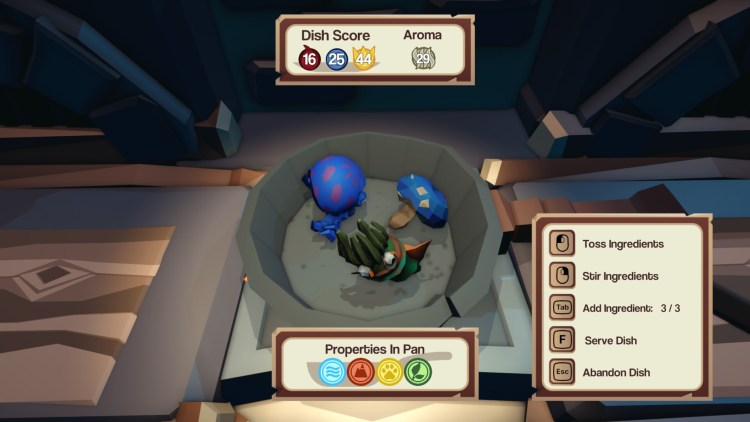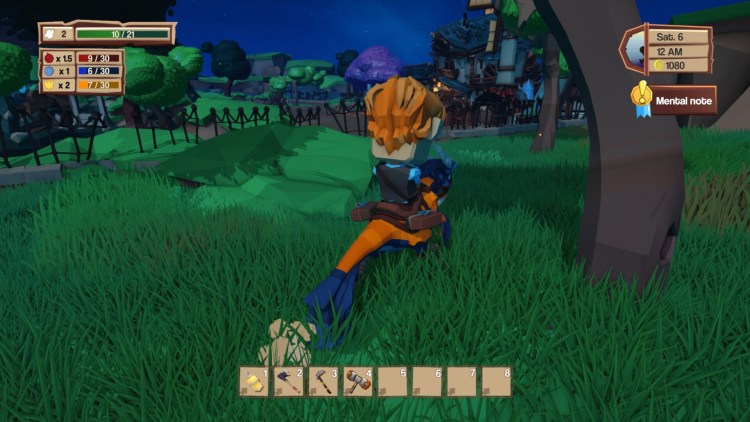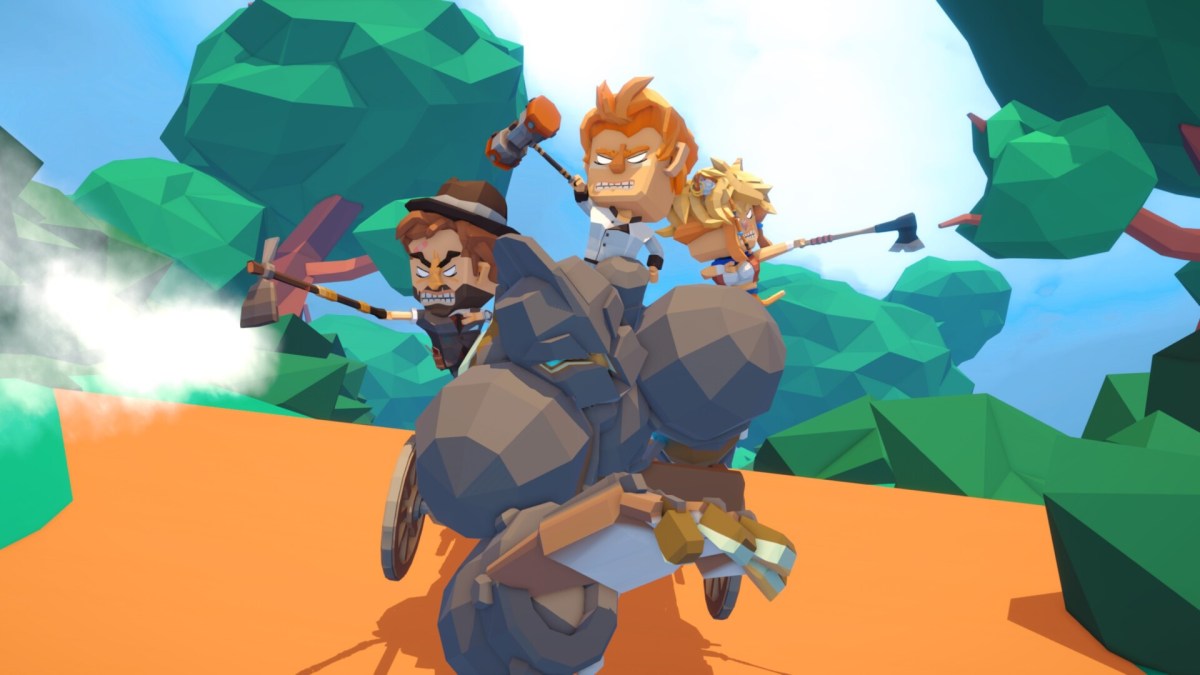I was excited to play Epic Chef after a cursory glance at its title and visual style. A cooking and restaurant-themed life sim with cooking battles? If that combination isn’t an absolute yes, then I don’t know what is. However, that’s misleading. There’s cooking, but only technically. There’s also a restaurant to run, but also only technically. The cooking is a simple, repetitive minigame and you mostly just tweak the restaurant’s menu and decor a bit, here and there. This is more of a narrative-focused crafting game. It can be tedious and can get old quick, but it’s also one of the funniest games I’ve ever played, so that’s worth something. It’s just not what I wanted nor expected.
Epic Chef tells the story of Zest, a guy who stows away aboard a ship to get to new lands. He’s purchased a house from a stranger desperate to give it away, and he’s sneaked into the country to take up residence there, away from his countrymen who may or may not be searching for him. The house he buys is considered a hellhole and he ends up getting embroiled in events surrounding a body of cooks known as the Culinarim. But, when Zest’s past catches up to him, he has to stand his ground and face the music.
The story is the best thing about Epic Chef. The game was developed by Infinigon Games, out of Barcelona. Either the writer speaks fluent English or the script was translated and localized by insanely talented individuals, because the game’s use of the English language is so spot-on and natural that I never would have guessed it was made outside of English-speaking territories. It’s simply laugh-out-loud hilarious all the time. So many of the jokes land with tremendous gusto. Whoever wrote the script should work in TV or movies too, because they’re that good.
Happy to serve!
Epic Chef is a third-person game with simple graphics that have plenty of personality. Despite being so heavy on story and providing such a small amount of space to move around in, the game is dense with mechanics. The basic root of everything is the cooking minigame. Again, it’s not really cooking. You make a dish by taking any three ingredients and dropping them in a pan. Then, you press a button to serve, with the dish you end up with being pretty much random. I was horribly disappointed by this, but it still has its charms.
In lieu of, you know, cooking, the important thing is to plan out a way to get the three elements of your dish as high as you can. Vigor is red, spirit is blue, and sophistication is yellow. Different ingredients have varied synergies. Drop something into an empty pan and you can get a bonus to one of the elements. Similarly, many ingredients will give you a bonus for adding them to a pan that contains other types of ingredients, which allows you to chain them together for big scores. It takes a surprising amount of planning and has quite a bit of depth.
Ingredients need to be sourced individually, either by growing them or scavenging. You can fish, pick up rats at the dock, and summon animals such as cows and weird chickens. Or, you can guide them to the slaughterhouse and take their meat. You can buy seeds or make them with three of a certain ingredient, but you’ll be doing a ton of crafting. You can also make sauces, which are mostly for cooking battles, or craft processed ingredients. You’ll also collect resources such as different types of wood to craft a bunch of useful objects.

The only “cooking” gameplay is flipping ingredients so they don’t burn and stirring them to make the element bubbles pop. That’s it.
Shokugeki no so what?
Cooking battles are one of the main challenges in Epic Chef. They’re necessary for progression, plus there are multi-round boss battles. There are cooking tournaments with multiple tiers to take part in as well. These reward you with tokens that can be used to purchase goodies, such as new outfits and accessories, or new ingredients you can make. The boss battles can be truly trying, though. The game doles out new stuff quite slowly, so it sometimes feels like you barely have any wiggle room to make it through. They also have no qualms with blocking off most of your sure-fire success routes just to throw a wrench in your plans.
Cooking battles can be as short as a single round, but whoever gets the highest score wins. Or you can just tie, which also lets you win, for some reason. It’s very satisfying to successfully win a bout by carefully planning out your sauces and ingredients. But, it can be a pain to get the things you need, as Epic Chef can be quite grindy. You get a restaurant about seven or eight hours into the game, but there are no restaurant sim things and no cooking orders for customers.
All you do is befriend the locals by completing their side quests (many of which are actually mandatory) to convince them to eat at your place. Then, they stop by and offer suggestions. Following those will increase your prestige, which acts as one of the primary progression barriers. The implementation of this is a bit shoddy, as sometimes I’d get someone to visit and they’d never leave feedback. Other times I’d get more prestige for no discernible reason. In order to put an item on the menu, you just drag a dish from your inventory onto the menu page and it’s on there. Disappointment strikes again.

You get a mount named Birch. He’s much faster than you and all you have to do is feed him. He’s a good boy.
Don’t you think I could save you?
Epic Chef is a fairly good game overall, but it has some things that majorly irk me. Much like Stardew Valley, the game saves only after you sleep. If you lose a boss battle, you automatically roll back to your last save. Due to the trial and error nature of the cooking battles (which can often require some memorization or failed attempts to figure out a strategy), not being able to manually save and avoid wasting precious ingredients is maddening. Having a manual save would have alleviated a lot of frustration.
I mentioned the game being tedious some of the time, and it absolutely is. I’m rather fond of many life sims, but this one reminded me of completing complex orders in My Time at Portia on occasion, and I kind of loathe that game. Waiting for animals to produce ingredients, working toward certain goals, and waiting for milestones can make the pacing seem glacial, even if Epic Chef has the courtesy of the next story quests becoming available immediately, which already makes it infinitely better than Portia. Simply put, aside from the story, I wasn’t massively enthused to play the game. It’s good, but it can be such a pain that I sometimes just didn’t feel like booting it up.
Regardless, Epic Chef is not only worth playing for its humor, but it also has a substantial amount of content, as it’s fairly lengthy. I hope some more quality of life changes happen (I also detest grinding for element bonuses to level up for more synergies), because the game would really benefit from a bit of extra game design polish. Still, it’s too hilarious for me to not recommend. Seriously, this game is almost too funny.










Published: Nov 11, 2021 09:00 am